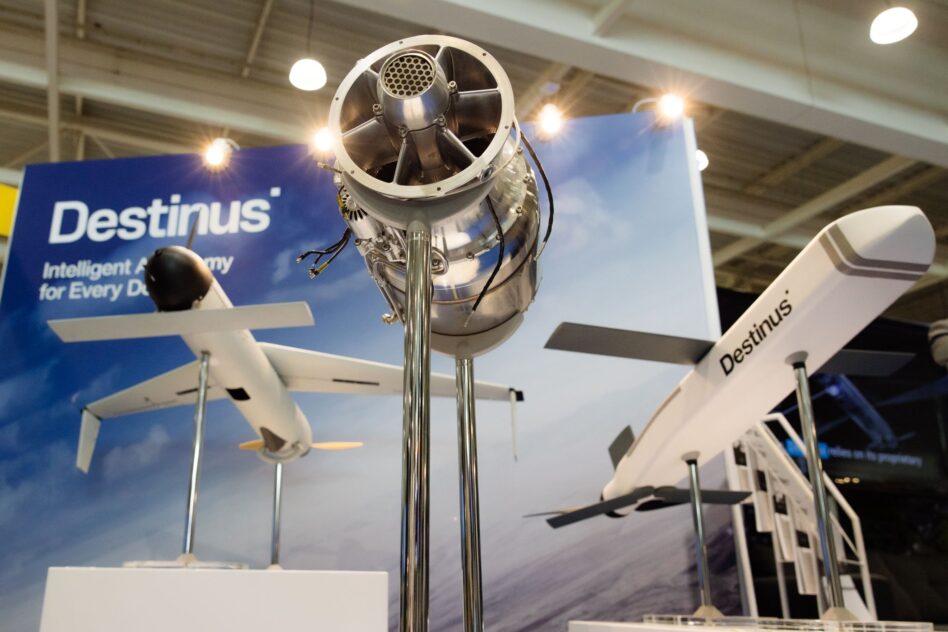The great leap across the pond continues.
Yesterday, US defense tech giant Shield AI announced that it’s partnering with European autonomous flight company Destinus to “integrate Hivemind, Shield AI’s mission autonomy software, across Destinus’ aerial platforms.”
“Destinus is one of Europe’s most consequential defense technology companies,” Chris Brinkley, Head of European Business Development and Strategy at Shield AI, told Tectonic.“Pairing Hivemind’s battle-proven autonomy with Destinus’ advanced designs, AI avionics, and industrial-scale manufacturing creates a powerful combination of software and systems expertise.”
Destinus CEO and Founder Mikhail Kokorich added that Hivemind and ISR from Shield’s V-BAT drone will boost his company’s strike capabilities.
“With almost all of our systems, we need to integrate them with reconnaissance systems, which can also play the role not only of reconnaissance and ISR, but also data relay here,” he told Tectonic. “Ultimately, when our systems are attacking, they’re very low, so it’s difficult to stay in communication.”
Fast friends: Destinus is a pretty huge player in the European drone game. The company was founded in 2021 by Kokorich, Alex Danyliuk, Tim Moser, and Alex Wicks and is headquartered in the Netherlands.
The company has a few different flavors of drones:
- Ruta: A jet-powered, autonomous cruise missile-shaped drone that can carry out “intelligence, fast-response surveillance, fast disaster & emergency response, emergency cargo supply, target training, [and] strike” missions. These have about a 300km range and are deployed in Ukraine.
- Lord: A low-cost cargo, ISR, and strike drone that looks like a tiny plane.
- Hornet: A smaller missile-shaped UAV/interceptor that comes in three configurations—“Hunter,” “Stalker,” or ”Plotter”—and can carry out missions including “situation[al] awareness, surveillance, 3D mapping, training, data relay, hostile drone interception, and intelligence.”
And both investors and operators have taken a shine to what Destinus has on offer.
- The company has raised a total of $351.59M—a mix of debt and equity. Most recently, in September, they secured a $164.17M bridge loan at a $1.76B valuation.
- With about 500 staff, the company is one of Europe’s largest drone manufacturers and has offices in Germany, Switzerland, France, the United Kingdom, Spain, and Ukraine.
- In August, the company acquired Switzerland-based firm Daedalean for about $225M to build “smarter AI-powered flight systems.”
Holding hands: So, how will the integration really work?
Kokorich told Tectonic that—put simply—V-BAT will act as the eyes (and the beating data and connectivity heart) of the two companies’ integrated autonomous missions, and Hivemind will be the brain. Destinus and its strike drones will provide the muscle.
“We’ll be using V-BAT, the surveillance one, because they fly pretty high,” he said, “It’s a good platform for the data layer [as well] because our systems fly very low. We have cruise missiles flying at barely 100 meters. That means you have limited range, so we always need to have a reconnaissance drone as a relay.”
Brinkley said that the Hivemind integration will start with Ruta and Hornet, and the two companies plan to hold initial joint demos in the first half of this year. From there, the plan is to sell to European and Ukrainian customers and tailor the integration on a case-by-case basis.
Kokorich said that plugging into Hivemind and teaming with V-BAT will actually be pretty easy because the two companies already use the same data link (he wouldn’t tell us which) and flavor of comms. He expects it to be completed in the next few months.
Puddle jump: We were left with one question for Shield—why Europe, and why now?
“Europe is making major investments in autonomy and industrial sovereignty, and Destinus represents the kind of partner that can accelerate deployment at scale,” Brinkley said.
Plus, Kokorich said, the US-European nature of the deal opens doors on both sides of the Atlantic. “We are a European company,” Kokorich added. “For us, access to the European market is easier; for Shield, which is American, some markets may be easier. So we also see…commercial opportunities [here].”
Brinkley concurred. “[The partnership] expands Shield AI’s access to European programs of record while giving Destinus the opportunity to demonstrate its platforms and technologies in the U.S. and with allied customers,” he added. The two companies are also “evaluating opportunities for collaborative production and technology sharing” in the future.

